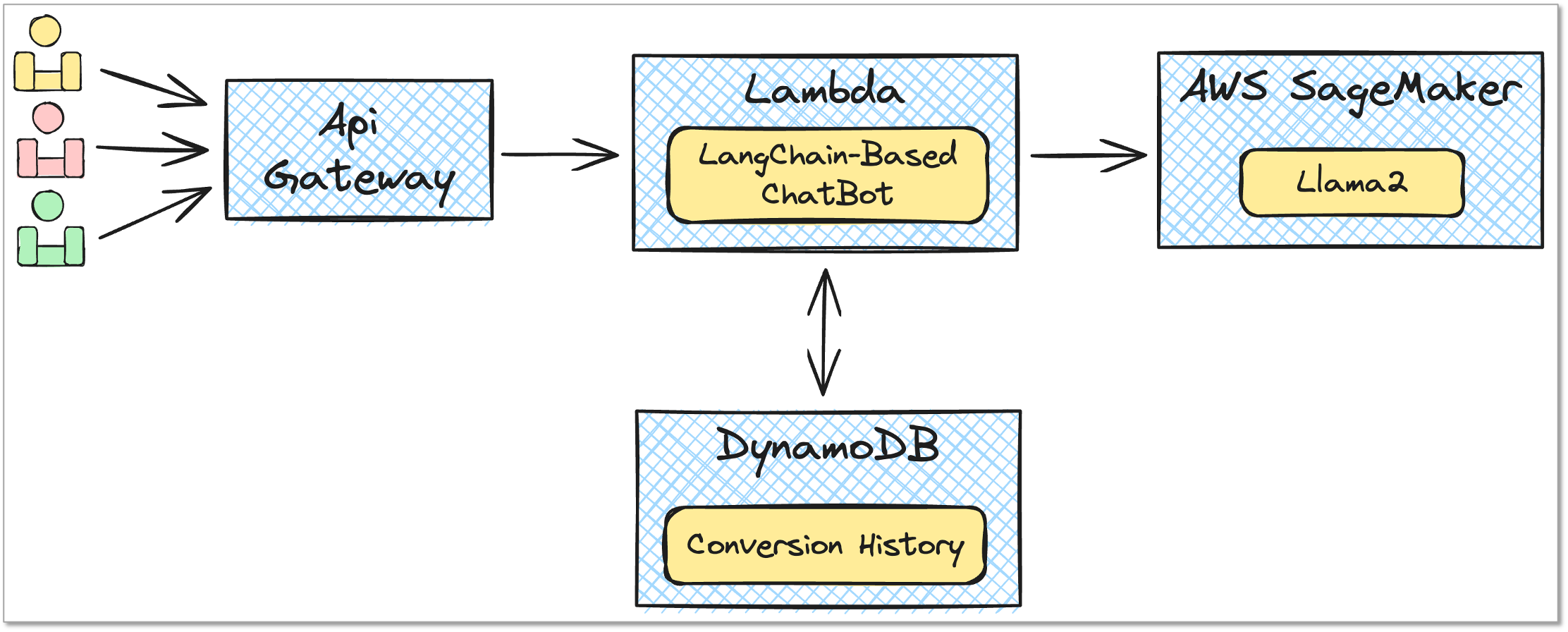Tags: #AWS #TypeScript #LangChain #Llama2
Code: https://github.com/pluto-lang/pluto/tree/main/examples/langchain-llama2-chatbot-sagemaker (opens in a new tab)
Building a Llama2 Conversational Chatbot with AWS and LangChain
In this guide, you'll discover how to create a simple conversational chatbot by integrating Pluto, AWS services, LangChain, and Llama2. We’ll walk you through the architecture components of our example application and how to deploy and operate it using Pluto.
Architecture Overview

As illustrated above, our example application relies on the following AWS services and resources:
- Amazon SageMaker: Deploying the Llama2 model
- Model, EndpointConfiguration, Endpoint, Role
- Amazon DynamoDB: Persisting session messages
- Table
- AWS Lambda: Executing backend business logic
- Function, Role, Policy
- Amazon API Gateway: Providing an HTTP API endpoint for user access
- Api, Route, Integration, Deployment, Stage
Comparison
The table below shows a comparison between Pluto and other tools regarding the amount and type of code:
| Code Type | Lines of Code | Code Location | |
|---|---|---|---|
| Application - TypeScript | Business Logic | 83(.ts) | Code (opens in a new tab) |
| Terraform (opens in a new tab) | Infrastructure Configuration | 201(.tf) | Code (opens in a new tab) |
| Pulumi (opens in a new tab) | Infrastructure Configuration | 157(.ts) | Code (opens in a new tab) |
| Pulumi Serverless (opens in a new tab) | Business Logic + Configuration | 256(.ts) | Code (opens in a new tab) |
| Winglang - TS (opens in a new tab) | Business Logic + Configuration | 100(.ts) | Code (opens in a new tab) |
| Winglang - Wing (opens in a new tab) | Business Logic + Configuration | 71(.w) + 47(.ts) | Code (opens in a new tab) |
| Serverless (opens in a new tab) | Business Logic + Configuration | 79(.ts) + 120(.yaml) | Code (opens in a new tab) |
| Pluto - TypeScript | Business Logic + Configuration | 100(.ts) | Code (opens in a new tab) |
| Application - Python | Business Logic | 73(.py) | Code (opens in a new tab) |
| Lepton (opens in a new tab) | Business Logic + Configuration | 116(.py) | Code (opens in a new tab) |
| Pluto - Python | Business Logic + Configuration | **84(.py) ** | Code (opens in a new tab) |
By examining the table data, the TypeScript and Python versions of the Pluto application add 17 and 11 lines of code, respectively, in contrast to pure business logic code. This includes code related to cloud resource creation and permission configuration. When infrastructure setup is handled using provisioning tools like Pulumi or Terraform, the combined code for business logic and infrastructure configuration exceeds twice the size of Pluto's code. Compared to tools such as Pulumi's Serverless feature, Winglang, Lepton, and Serverless, which streamline cloud usage, Pluto demands lower cloud and AI background knowledge and entails less code.
While using other tools, we faced several issues that ultimately hindered the deployment of this code. For instance, Winglang lacks support for SageMaker Model and EndpointConfig resource types, Pulumi runtime errors, and intricate resource configuration. If you're interested, feel free to lend a hand with the fixes.
Deployment Steps
To deploy this chatbot, please follow the steps below:
-
Install Pluto and configure AWS access credentials. Detailed instructions can be found in the Pluto Quick Start Guide (opens in a new tab).
-
Run the following commands in the root directory of the example application to initialize:
npm install -
Replace
HUGGING_FACE_HUB_TOKENin thesrc/index.tsfile with your Hugging Face Hub Token. If you don’t have a token yet, generate one here (opens in a new tab). -
Deploy the application:
pluto deploy
Be patient, as deploying the model in SageMaker can take some time. Once the deployment is complete, the console will display the URL for ApiGateway, which you can access via a browser or a curl command. Here is a simple test command:
CHATBOT_API_URL=your ApiGateway URL
time curl --get "$CHATBOT_API_URL/chat" \
--data-urlencode "sessionid=session_1" \
--data-urlencode "query='What is the capital of China?'"By using the same sessionid, you can conduct multiple rounds of conversation testing.
To clean up resources, simply run the pluto destroy command in the root directory of the example application.
Extending the Example Application
This example application serves as a basic chatbot, but you can expand it based on your needs to make it more powerful and practical. For instance, you could:
- Add custom business logic: Write more Lambda functions to execute more complex business logic tailored to specific business needs.
- Integrate additional AWS services: Take advantage of the wide array of services provided by AWS, such as Amazon SNS as a message queue for asynchronous message processing.
- Enhance user experience: Develop a frontend user interface to allow users to interact with the chatbot through a web page or mobile app, rather than solely through API requests.